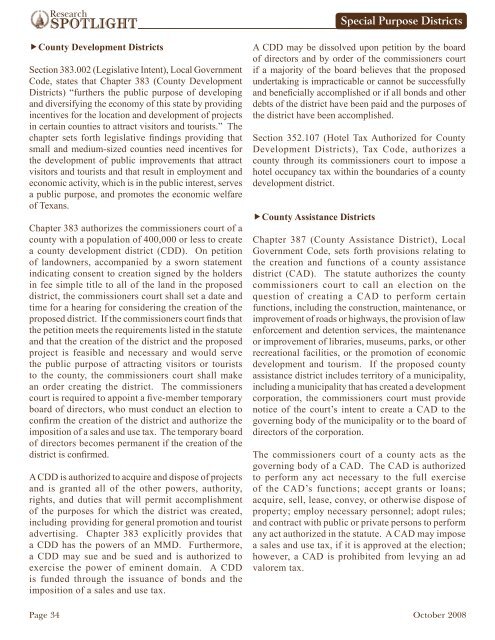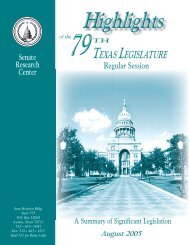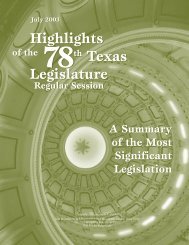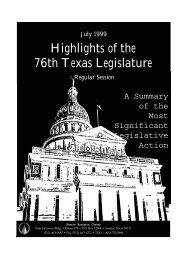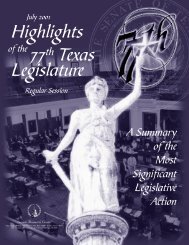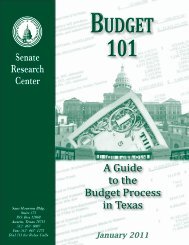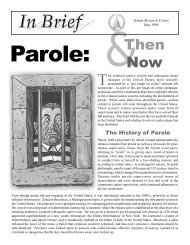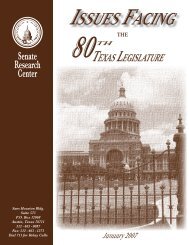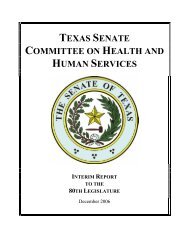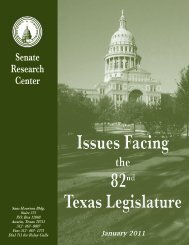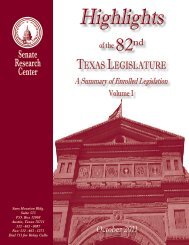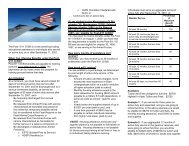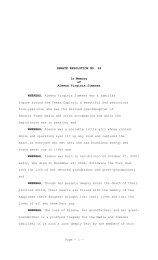Invisible Government: Special Purpose Districts in Texas - Senate
Invisible Government: Special Purpose Districts in Texas - Senate
Invisible Government: Special Purpose Districts in Texas - Senate
You also want an ePaper? Increase the reach of your titles
YUMPU automatically turns print PDFs into web optimized ePapers that Google loves.
Research<br />
SPOTLIGHT<br />
ffCounty Development <strong>Districts</strong><br />
Section 383.002 (Legislative Intent), Local <strong>Government</strong><br />
Code, states that Chapter 383 (County Development<br />
<strong>Districts</strong>) “furthers the public purpose of develop<strong>in</strong>g<br />
and diversify<strong>in</strong>g the economy of this state by provid<strong>in</strong>g<br />
<strong>in</strong>centives for the location and development of projects<br />
<strong>in</strong> certa<strong>in</strong> counties to attract visitors and tourists.” The<br />
chapter sets forth legislative f<strong>in</strong>d<strong>in</strong>gs provid<strong>in</strong>g that<br />
small and medium-sized counties need <strong>in</strong>centives for<br />
the development of public improvements that attract<br />
visitors and tourists and that result <strong>in</strong> employment and<br />
economic activity, which is <strong>in</strong> the public <strong>in</strong>terest, serves<br />
a public purpose, and promotes the economic welfare<br />
of Texans.<br />
Chapter 383 authorizes the commissioners court of a<br />
county with a population of 400,000 or less to create<br />
a county development district (CDD). On petition<br />
of landowners, accompanied by a sworn statement<br />
<strong>in</strong>dicat<strong>in</strong>g consent to creation signed by the holders<br />
<strong>in</strong> fee simple title to all of the land <strong>in</strong> the proposed<br />
district, the commissioners court shall set a date and<br />
time for a hear<strong>in</strong>g for consider<strong>in</strong>g the creation of the<br />
proposed district. If the commissioners court f<strong>in</strong>ds that<br />
the petition meets the requirements listed <strong>in</strong> the statute<br />
and that the creation of the district and the proposed<br />
project is feasible and necessary and would serve<br />
the public purpose of attract<strong>in</strong>g visitors or tourists<br />
to the county, the commissioners court shall make<br />
an order creat<strong>in</strong>g the district. The commissioners<br />
court is required to appo<strong>in</strong>t a five-member temporary<br />
board of directors, who must conduct an election to<br />
confirm the creation of the district and authorize the<br />
imposition of a sales and use tax. The temporary board<br />
of directors becomes permanent if the creation of the<br />
district is confirmed.<br />
A CDD is authorized to acquire and dispose of projects<br />
and is granted all of the other powers, authority,<br />
rights, and duties that will permit accomplishment<br />
of the purposes for which the district was created,<br />
<strong>in</strong>clud<strong>in</strong>g provid<strong>in</strong>g for general promotion and tourist<br />
advertis<strong>in</strong>g. Chapter 383 explicitly provides that<br />
a CDD has the powers of an MMD. Furthermore,<br />
a CDD may sue and be sued and is authorized to<br />
exercise the power of em<strong>in</strong>ent doma<strong>in</strong>. A CDD<br />
is funded through the issuance of bonds and the<br />
imposition of a sales and use tax.<br />
<strong>Special</strong> <strong>Purpose</strong> <strong>Districts</strong><br />
A CDD may be dissolved upon petition by the board<br />
of directors and by order of the commissioners court<br />
if a majority of the board believes that the proposed<br />
undertak<strong>in</strong>g is impracticable or cannot be successfully<br />
and beneficially accomplished or if all bonds and other<br />
debts of the district have been paid and the purposes of<br />
the district have been accomplished.<br />
Section 352.107 (Hotel Tax Authorized for County<br />
Development <strong>Districts</strong>), Tax Code, authorizes a<br />
county through its commissioners court to impose a<br />
hotel occupancy tax with<strong>in</strong> the boundaries of a county<br />
development district.<br />
ffCounty Assistance <strong>Districts</strong><br />
Chapter 387 (County Assistance District), Local<br />
<strong>Government</strong> Code, sets forth provisions relat<strong>in</strong>g to<br />
the creation and functions of a county assistance<br />
district (CAD). The statute authorizes the county<br />
commissioners court to call an election on the<br />
question of creat<strong>in</strong>g a CAD to perform certa<strong>in</strong><br />
functions, <strong>in</strong>clud<strong>in</strong>g the construction, ma<strong>in</strong>tenance, or<br />
improvement of roads or highways, the provision of law<br />
enforcement and detention services, the ma<strong>in</strong>tenance<br />
or improvement of libraries, museums, parks, or other<br />
recreational facilities, or the promotion of economic<br />
development and tourism. If the proposed county<br />
assistance district <strong>in</strong>cludes territory of a municipality,<br />
<strong>in</strong>clud<strong>in</strong>g a municipality that has created a development<br />
corporation, the commissioners court must provide<br />
notice of the court’s <strong>in</strong>tent to create a CAD to the<br />
govern<strong>in</strong>g body of the municipality or to the board of<br />
directors of the corporation.<br />
The commissioners court of a county acts as the<br />
govern<strong>in</strong>g body of a CAD. The CAD is authorized<br />
to perform any act necessary to the full exercise<br />
of the CAD’s functions; accept grants or loans;<br />
acquire, sell, lease, convey, or otherwise dispose of<br />
property; employ necessary personnel; adopt rules;<br />
and contract with public or private persons to perform<br />
any act authorized <strong>in</strong> the statute. A CAD may impose<br />
a sales and use tax, if it is approved at the election;<br />
however, a CAD is prohibited from levy<strong>in</strong>g an ad<br />
valorem tax.<br />
Page 34 October 2008


